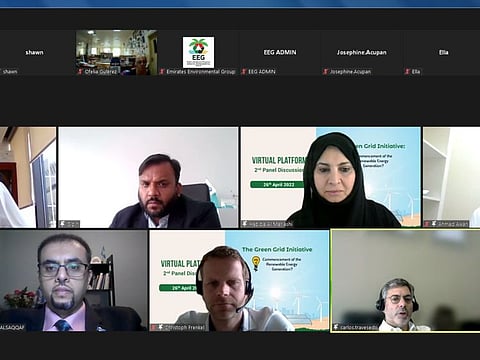Emirates Environmental Group highlights ‘Green Grid’ as key to clean energy
Energy transition is pivotal in tackling global climate concerns, panelists reaffirm

Dubai: The second panel discussion of the Emirates Environmental Group (EEG) for 2022 was held virtually with attendance from different parts of the world on Tuesday.
The discussion, held under the title ‘The Green Grid Initiative: Commencement of the Renewable Energy Generation?’ aimed to foster an open conversation about all aspects of the renewable energy industry for the implementation, integration, need to shift to more sustainable production and consumption of energy and many other vital facets.
According to the Intergovernmental Panel on Climate Change (IPCC) report released in February 2022, the world will face unavoidable multiple climate hazards over the next two decades due to global warming. Human-induced climate change is causing dangerous and widespread disruption, despite the efforts to reduce the risks. Increased heat-waves, droughts and floods are already exceeding the tolerance level of plants and animals, driving mass mortalities in species.
These extreme weather conditions are occurring simultaneously, causing cascading impacts that are increasingly difficult to manage. To avoid the mounting loss of life, biodiversity and infrastructure, accelerated action is required to adapt to climate change and at the same time make rapid, deep cuts in greenhouse gas emissions. There was unanimity among the panellists that energy transition holds the key to tackle global climate concerns.
‘Championing the cause of sustainability’
Habiba Al Mar’ashi, co-founder and chairperson of EEG, in her opening speech, said: “The UAE has always championed the cause of sustainability. The various initiatives for sustainable developments in the UAE have time and again focused on the conservation of the environment through clean energy, green development and finding alternative eco-friendly solutions for the increasing demand for water and electricity requirements in the country.
"Development of renewable energy sources in the UAE has powered its efforts towards achieving long-term sustainability in every aspect of its governance. The renewable energy sources in the UAE will prove monumental in the coming years to reduce the country’s carbon footprint and help it achieve its overall sustainability milestones.”
The session was headed by Faisal Ali Rashid, senior director, Dubai Supreme Council of Energy, who opened the session and set the tone for the discussions.
Multi-fold benefits
Other speakers brought to the table the latest innovations in this field and emphasised that world energy consumption has increased between 2000-2018, though energy-efficiency has declined by 22.5 per cent. Speaking on the importance of Green energy, Dr Raidan Al Saqqaf, economist, United Nations Office in Abu Dhabi, stressed on the multi-fold benefits on environmental, financial and societal dimensions.
Dr Ahmed Awan, assistant professor — College of Engineering and IT, Ajman University, added that Dubai Net Zero Emissions Strategy 2050 aims to provide 100 per cent of its energy production capacity from clean energy sources by 2050. He also spoke about the UAE Energy Strategy 2050 that targets to increase the contribution of clean energy in the total energy mix to 50 per cent by 2050, while reducing the carbon footprint of power generation by 70 per cent.
Carlos Travesedo, Energy Policy executive director in the Department of Energy (DoE)-Abu Dhabi, said the UAE has become the first Gulf state to commit effectively and efficiently to fully decarbonise and reach net zero greenhouse gases by 2050.
Gipin Korah Mani, country director, TotalEnergies Solar Middle East, discussed various renewable solutions to meet the growing demand for storage facilities such as solar, wind and energy.
Establishment of renewable grids
Christoph Frenkel, project leader, Thuringian Renewable Energy Network (ThEEN), detailed various initiatives taken by ThEEN, such as Zero Carbon Cross Energy System, Smart Neighbourhood, Green Hydrogen for industrial applications in Thuringia, Environmental heat for Central Germany, and others.
The successful establishment of global renewable grids will effectively contribute to achieving several UN Sustainable Development Goals: #3 — Good Health and Well Being, #7 — Affordable and Clean Energy, #11 — Sustainable Cities and Communities, #13 — Climate Action, #14 — Life Below Water, #15 — Life on Land and #17 — Partnership for Goals.
The panel discussion concluded with interactive and detailed round of questions asked to the panellists by the head of the session as well as from the attendees. The audience took away in-depth knowledge with varying perspectives from the different sectors of the industry. They also had an overview of the progress made in this field and the actions required to make the global renewable green grid a reality.



